by Charlie Litton, UNeMed
OMAHA, Neb. (Oct. 25, 2013)—It almost sounds like the start of a bad joke: A Russian, a Nebraskan and an MIT scientist are sitting at a table…
But here the Russian saw a problem and thought of a way to fix it. The Nebraskan knew how to make the vision a reality, and the MIT scientist brought the two together in a cross-pollination of disciplines and university campuses.
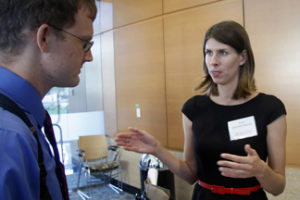
UNMC researcher Anna Brynskikh Boyum (right) chats with business partner Tom Frederick — an engineering doctorate candidate at UNL — during the 2013 UNMC Startup Company Demonstration Day reception in the Durham Research Center.
Anna Brynskikh Boyum left her home in Moscow in 2006 to chase her pharmacology doctorate at the University of Nebraska Medical Center. At the same time, Tom Frederick was finishing up his senior year at Mt. Michael High School in Elkhorn, Neb. And Shane Farritor, an MIT trained engineer at the University of Nebraska-Lincoln, was likely working on some kind of small robot that might make wide-ranging things like surgery or railroads safer.
Farritor had already worked with Jet Propulsion Laboratory and NASA to help design the Mars rovers when he came to Omaha for the 2012 Innovation Awards—hosted by UNeMed Corporation, the technology transfer office at UNMC. He was there to receive an award for a securing his 13th U.S. patent, and meet with other University researchers and innovators.
Boyum, meanwhile, had been stewing on an idea for a few months, thinking, “I need an engineer’s take on this.” She hoped to find that help at the Innovation Awards ceremony. Then she saw Farritor browsing the buffet line at the Innovation Awards reception.
As a grad student in UNMC’s Center for Drug Delivery and Nanomedicine, Boyum spent a lot of her time in front of a cryostat machine, a tool that can shave frozen tissue samples into layers so thin it would take a stack of them to equal the average human hair.
Such thin slices can reveal a multitude of things, such as cancerous cells from a liver biopsy.
But the delicate slices tend to curl, wrinkle or tear before a lab technician can get the sample onto a slide for microscopic analysis. Often enough, they just melt away during the brief struggle.
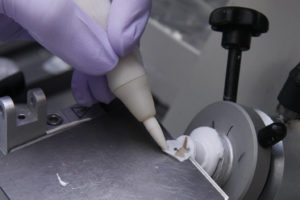
Here, Elegant Instruments’ Versatool helps a researcher keep a thin slice of frozen liver from curling or tearing so it can be placed on a slide for microscopic analysis.
Technicians fight with these frozen and nearly transparent samples with a set of tools they scrounge together from unexpected places.
“What I did, what everyone else did, and still does,” Boyum said, “is go to the art supply store for brushes. And a butter knife from home.”
The problem is each technician might have their own collection of tools, and they all need to be kept somewhere. All these tools are stored in cryostat machines, cluttering the way for technicians who follow.
But the bigger problem is the bristles wear out quickly, and the metal piece that holds the bristles to the handle, the ferrule, can conduct static electricity and the technician’s body heat to the sample. The transfer of heat and electrical charge makes handling the wispy samples that much more difficult.
What if all these brushes could be combined into one tool, specifically designed for the task?
She asked Farritor if it could be done.
Farritor, who secured his 14th patent this year, is perhaps best known for his work with UNMC researcher Dmitry Oleynikov creating surgical robots. Together, Farritor and Oleynikov founded a new company, Virtual Incision, which has attracted more than $3 million in investments so far. For his part, Oleynikov is listed with nine U.S. patents.
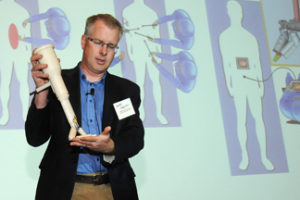
Shane Farritor, an engineer at UNL and co-founder of Virtual Incision, displays his new surgical device during UNeMed’s first UNMC Startup Company Demonstration Day.
Farritor passed Boyum’s idea to one of his graduate students, Tom Frederick, 24, a doctoral candidate in mechanical and material engineering.
“He gets requests all the time,” Frederick said of Farritor. “Every once in a while I’ll poke him for projects, which led him to say, ‘I met this pathologist at UNMC…'”
Frederick jumped on the idea with both feet.
What began as a simple idea, is now Versatool — An ergonomically designed handle with an integrated knife and interchangeable tips using a slick, magnetic coupling system. The design also conducts less heat and less static electricity.
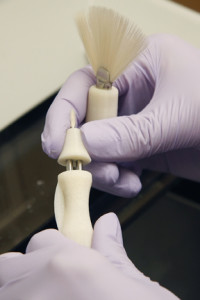
Versatool features a magnetic coupling system so technicians can quickly change tips for different tasks.
The elegant design perhaps inspired the name of the startup company they formed together, Elegant Instruments.
Boyum and Frederick completed the circle during the 2013 installment of Innovation Week. On Oct. 7, Boyum and Frederick were among the presenters for the first-ever UNMC Startup Company Demonstration Day. There, they officially launched their first product, which can be purchased online.
“Without that face-to-face meeting, this might not have happened,” Frederick said.
— — —
UNeMed Corporation is the technology transfer office (TTO) for the University of Nebraska Medical Center, serving researchers, faculty and staff who develop new biomedical technology and inventions. UNeMed strives to help bring those innovations to the marketplace for a healthier and better world.

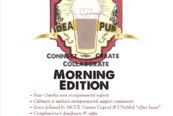
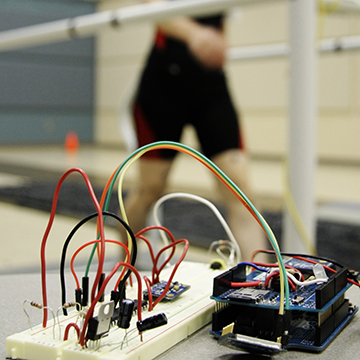
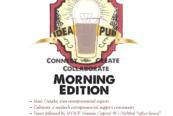
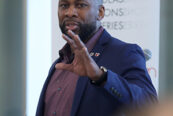



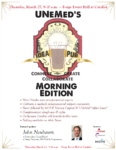
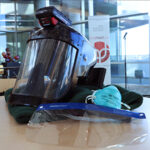
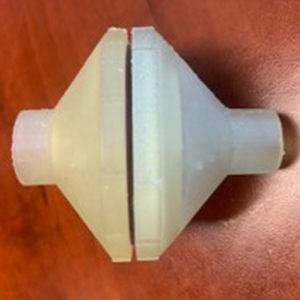
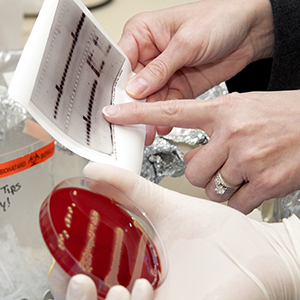
[…] 9. New startup grows from Innovation Week connection […]